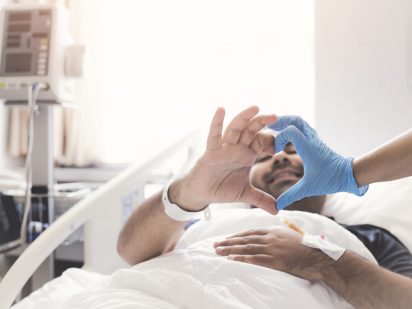Organ Donation Can Help Many
There are 113,785 people in the United States – 3,369 of them in the North Dakota, South Dakota, and Minnesota tri-state area – awaiting a life-saving transplant.
The year 2018 tied with 2017 as a record year for the number of organ donors in the tri-state area. In 2018, 184 organ donors yielded 567 organs for transplants. In addition, 673 tissue donors helped to heal 50,000 potential lives, and 223 eye donors led to 326 corneas transplanted.
Specifically, through Trinity Health, with one organ donor, four lives were saved. Additionally, seven tissue donors healed 525 individuals and 15 eye donors restored sight for 30 individuals, according to statistics from LifeSource, the non-profit organization dedicated to saving lives through organ, eye, and tissue donation in the tri-state area.
“We are deeply humbled and honored to serve a community that strongly supports the mission of donation,” said Susan Gunderson, LifeSource CEO. “Thanks to this support and the dedication of our team and partners, 2018 was a remarkably impactful year.”
April is National Donate Life Month, an important time set aside to honor those who have given the gift of life through organ and tissue donation, celebrate the successes of transplantation, and encourage more people to register as organ and tissue donors.
Trinity Health follows a strategic plan and guidelines to meet as many organ and tissue donations as possible. When a patient meets the criteria to be an organ or tissue donor, Trinity Health calls LifeSource, whose personnel determines if the patient may or may not be a potential donor. If the patient does meet criteria for donation, LifeSource will reach out to the family to discuss the donation process. If the patient has requested to be a donor or the family wishes to offer donation, LifeSource will then come into the hospital and start the donation process.
Making your intentions known is as easy as a notation on your driver’s license – the commonly accepted legal expression of your wish to donate. However, it is wise to share your decision with family members to ensure that they will support and honor your choice.
It is important that a person who wishes to be an organ donor registers officially as one. Having “Organ Donor” on your driver’s license is the most recognized form, nationally, of being on the organ donor registry. This makes it easier for family to make the decision when it comes to it.
If you are considering organ donation, perhaps you’ve wondered about ethical or religious viewpoints. Most major religions support organ donation as a noble and compassionate act. Other religions view donations as a matter of personal choice. (The viewpoints of many religious organizations are available at www.organdonation.org.)
Every person waiting for an organ transplant is registered with the United Network for Organ Sharing (UNOS). When a family gives its permission for organ donation, UNOS runs a computerized list of potential recipients in order to find a match. Organs are distributed based on factors such as medical urgency, compatible blood and tissue type, body size, and the length of time on the waiting list. All of the expenses related to organ donation are covered by LifeSource and passed on to the recipient and their insurer. Organ donation is a gift that saves and enhances the lives of many.
If you are interested in learning more about organ donation, call the LifeSource central office at 1-888-5DONATE, or go online: www.lifesource.org.

